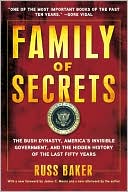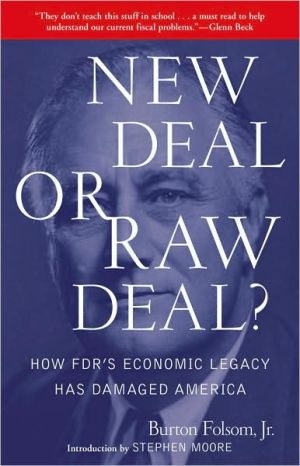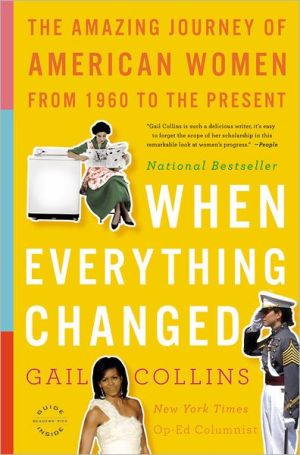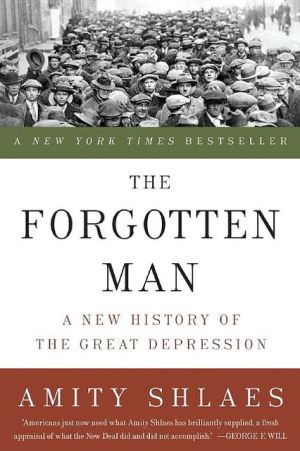My Fellow Americans: Presidents Speak to the People in Troubled Times
The most interesting and inspiring presidential speeches, from Franklin Roosevelt to Barack Obama.\ From Franklin Roosevelt to Barack Obama, American presidents have faced unprecedented challenges at home and abroad. From the onset of the Great Depression, through World War II, the Korean War, the Cuban Missile Crisis, the Cold War, Desert Storm and the War on Terror, American presidents have warned and rallied the nation during each crisis. Presidents have also addressed the people in times...
Search in google:
The most interesting and inspiring presidential speeches, from Franklin Roosevelt to Barack Obama. Publishers Weekly Though overwhelming in its entirety, this collection of presidential speeches provides an insightful look at our nation's darkest periods, and the careful words our leaders chose to offer comfort and inspiration. In each of the book's six sections, covering 1935 to the present, author, publisher and historian Worek's carefully selected speeches illustrate perfectly each era's most pervasive challenges. Some speeches will spark instant recognition, including FDR's inaugural speech ("the only thing we have to fear is fear itself") and Gerald Ford's swearing-in ("I am acutely aware that you have not elected me as your President by your ballots"), and many phrases from Depression-era speeches, though 75 years old, sound eerily contemporary. The book's focus on devastating national events (the 1995 Oklahoma Bombings, the September 11 terrorist attacks, etc.) is inescapably depressing, but brings a measure of much-needed perspective on today's pressing issues. Happily, Worek ends with words of hope from President Obama: "We will rebuild, we will recover." Copyright © Reed Business Information, a division of Reed Elsevier Inc. All rights reserved.
Table of ContentsContents Part One The Only Thing We Have to Fear is Fear Itself.Introduction Timeline IntroductionFranklin D. Roosevelt 1933-1945The Great Depression So, first of all, let me assert my firm belief that the only thing we have to fear is fear itself -- nameless, unreasoning, unjustified terror which paralyzes needed efforts to convert retreat into advance. Inaugural Address, March 4, 1933The New Deal To dole out relief in this way is to administer a narcotic, a subtle destroyer of the human spirit ... It is in violation of the traditions of America. Work must be found for able-bodied but destitute workers. The Federal Government must and shall quit this business of relief. State of the Union Address, January 4, 1935Preparing For War It is unmistakably apparent to all of us that, unless the advance of Hitlerism is forcibly checked now, the western hemisphere will be within range of the Nazi weapons of destruction. Radio Address Announcing an Unlimited National Emergency, May 27, 1941Pearl Harbor Yesterday, December 7, 1941 -- a date which will live in infamy -- the United States of America was suddenly and deliberately attacked by naval and air forces of the Empire of Japan. Address to Congress Requesting a Declaration of War with Japan, December 8, 1941All-Out War We have already tasted defeat. We may suffer further setbacks. We must face the fact of a hard war, along war, a bloody war, a costly war. State of the Union Address, January 6, 1942Contents Part Two The Threat of War is Still very RealTimeline IntroductionHarry S. Truman 1945-1953The Truman Doctrine The seeds of totalitarian regimes are nurtured by misery and want. They spread and grow in the evil soil of poverty and strife. They reach their full growth when the hope of a people for a better life has died. Address before a Joint Session of Congress, March 12, 1947Communism vs. Democracy We are aided by all who desire freedom of speech, freedom of religion, and freedom to live their own lives for useful ends. Our allies are the millions who hunger and thirst after righteousness. Inaugural Address, January 20, 1949The Korean War Our men are fighting, alongside their United Nations allies, because they know, as we do, that the aggression in Korea is part of the attempt of the Russian communist dictatorship to take over the world, step by step. State of the Union Address, January 8, 1951Soviet Aggression Do not be deceived by the strong face, the look of monolithic power that the communist dictators wear before the outside world. Remember their power has no basis in consent. State of the Union Address, January 7, 1953Farewell Address There is no job like it on the face of the earth in the power which is concentrated here at this desk, and in the responsibility and difficulty of the decisions. January 15, 1953Dwight D. Eisenhower 1953-1961Faith In Freedom The world and we have passed the midway point of a century of continuing challenge. We sense with all our faculties that forces of good and evil are massed and armed and opposed as rarely before in history. Inaugural Address, January 20, 1953International Communism The divisive force is international communism and the power that it controls. The designs of that power, dark in purpose, are clear in practice. It strives to seal forever the fate of those it has enslaved. It strives to break the ties that unite the free. Inaugural Address, January 21, 1957Farewell Address In the councils of government, we must guard against the acquisition of unwarranted influence, whether sought or unsought, by the military-industrial complex. The potential for the disastrous rise of misplaced power exists and will persist. January 17, 1961Contents Part Three To Defend Freedom in its Hour of Maximum DangerTimeline IntroductionJohn F. Kennedy 1961-1963Religious Freedom I believe in an America where the separation of church and state is absolute; where no Catholic prelate would tell the President ... how to act, and no Protestant minister would tell his parishioners for whom to vote. Houston Ministerial Association September 12, 1960A New Generation In the long history of the world, only a few generations have been granted the role of defending freedom in its hour of maximum danger. I do not shrink from this responsibility -- I welcome it. Inaugural Address, January 20, 1961The Berlin Crisis West Berlin ... has now become, as never before, the great testing place of Western courage and will, a focal point where our solemn commitments stretching back over the years since 1945, and Soviet ambitions now meet in basic confrontation. Report to the American People, July 25, 1961The Cuban Missile Crisis For many years, both the Soviet Union and the United States ... have deployed strategic nuclear weapons with great care, never upsetting the precarious status quo which insured that these weapons would not be used in the absence of some vital challenge. Report to the American People October 22, 1962The Search for Peace We must deal with the world as it is, and not as it might have been had the history of the last 18 years been different. We must, therefore, persevere in the search for peace in the hope that constructive changes within the communist bloc might bring within reach solutions which now see beyond us. American University Address, June 10, 1963Civil Rights The fires of frustration and discord are burning in every city, North and South, where legal remedies are not at hand. Redress is sought in the streets, in demonstrations, parades, and protests which create tensions and threaten violence and threaten lives. Radio and Television Report, June 11, 1963The Berlin Wall All free men, wherever they may live, are citizens of Berlin. And, therefore, as a free man, I take pride in the words "Ich bin ein Berliner." Remarks at the Rudolph Wilde Platz June 26, 1963Lyndon B. Johnson 1963-1969John F. Kennedy's Assassination All I have I would have given gladly not to be standing here today. The greatest leader of our time has been struck down by the foulest deed of our time. Address to Joint Session of Congress November 27, 1963The Great Society The Great Society rests on abundance and liberty for all. It demands an end to poverty and racial injustice, to which we are totally committed in our time. But that is just the beginning. Remarks at the University of Michigan May 22, 1964We Shall Overcome There is no Negro problem. There is no Southern problem. There is no Northern problem. There is only an American problem. Special Message to Congress, March 15, 1965The Domino Theory We have chosen to fight a limited war in Vietnam in an attempt to prevent a larger war -- a war almost certain to follow, I believe, if the communists succeed in overrunning and taking over South Vietnam by aggression and by force. State of the Union Address, January 10, 1967On Vietnam But let men everywhere know, however, that a strong and a confident and a vigilant America stands ready tonight to seek an honorable peace; and stands ready tonight to defend an honored cause, whatever the price, whatever the burden, whatever the sacrifice that duty may require. Address to the Nation, March 31, 1968Contents Part Four How Can We Win America's Peace?Timeline IntroductionRichard Nixon 1969-1974A New Beginning We cannot learn from one another until we stop shouting at one another -- until we speak quietly enough so that our words can be heard as well as our voices. For its part, government will listen. Inaugural Address, January 20, 1969On the War in Vietnam Let us all understand that the question before us is not whether some Americans are for peace and some Americans are against peace. The question at issue is not whether Johnson's war becomes Nixon's war. The great question is: How can we win America's peace? Address to the Nation, November 3, 1969A New Era of Peace The time has passed when America will make every other nation's conflict our own, or make every other nation's future our responsibility, or presume to tell the people of other nations how to manage their own affairs. Inaugural Address, January 20, 1973President Nixon's Resignation I have never been a quitter. To leave office before my term is completed is abhorrent to every instinct in my body. But as President, I must put the interests of America first. Address to the Nation, August 8, 1974Gerald Ford 1974-1977A Talk Among Friends I assume the Presidency under extraordinary circumstances never before experienced by Americans. This is an hour of history that troubles our minds and hurts our hearts. Address on Taking the Oath of the U.S. Presidency, August 9, 1974Pardoning Richard Nixon Richard Nixon ... is an American tragedy in which we all have played a part. It could go on and on and on, or someone must write the end to it. I have concluded that only I can do that, and if I can, I must. Address to the Nation, September 8, 1974Farewell Address I am proud that today America is at peace. None of our sons are fighting and dying in battle anywhere in the world. And the chance for peace among all nations is improved by our determination to honor our vital commitments in defense of peace and freedom. January 12, 1977Jimmy Carter 1977- 1981A Rekindling of Confidence We know that if we despise our own government, we have no future. We recall in special times when we have stood briefly, but magnificently, united. In those times no prize was beyond our grasp. Inaugural Address, January 20, 1977American Hostages in Iran Let our position be absolutely clear. An attempt by any outside force to gain control of the Persian Gulf region will be regarded as an assault on the vital interests of the United States of America, and such an assault will be repelled by any means necessary, including military force. State of the Union Address, January 23, 1980Contents Part Five The Beginning of a New Era in the World's Affairs.Timeline Introduction Ronald Reagan 1981-1989A Time for Choosing This is the issue of this election: whether we believe in our capacity for self-government or whether we abandon the American revolution and confess that a little intellectual elite in a far-distant capital can plan our lives for us better than we can plan them ourselves. Address on Behalf of Senator Barry Goldwater October 27, 1964Government is the Problem In this present crisis, government is not the solution to our problem; government is the problem. From time to time we've been tempted to believe that society has become too complex to be managed by self-rule, that government by an elite group is superior to government for, by, and of the people. Inaugural Address, January 20, 1981The Evil Empire I urge you to beware the temptation of pride -- the temptation of blithely declaring yourselves above it all and label both sides equally at fault, to ignore the facts of history and the aggressive impulses of an evil empire, to simply call the arms race a giant misunderstanding. Speech to the National Association of Evangelicals, March 8, 1983United States-Soviet Relations Neither we nor the Soviet Union can wish away the differences between our two societies and our philosophies, but we should always remember that we do have common interests and the foremost among them is to avoid war and reduce the level of arms. Address to the Nation, January 16, 1984At the Brandenburg Gate In the 1950s Khrushchev predicted: "We will bury you." But in the West today, we see a free world that has achieved a level of prosperity and well-being unprecedented in all human history. In the communist world, we see failure, technological backwardness, declining standards of health, even want of the most basic kind -- too little food. Remarks at the Brandenburg Gate, June 12, 1987Farewell Address Nothing is less free than pure communism, and yet we have, the past few years, forged a satisfying new closeness with the Soviet Union. I've been asked if this isn't a gamble, and my answer is no because we are basing our actions not on words but deeds. January 11, 1989George H.W. Bush 1989-1993The Revolution of 1989 Nineteen forty-five provided the common frame of reference, the compass points of the postwar era we've relied upon to understand ourselves. And that was our world, until now. The events of the year just ended, the Revolution of '89, have been a chain reaction, changes so striking that it marks the beginning of a new era in the world's affairs. State of the Union Address, January 31, 1990Tomorrow's Challenges But even in the midst of celebration, we must keep caution as a friend. For the world is still a dangerous place. Only the dead have seen the end of conflict. And though yesterday's challenges are behind us, tomorrow's are being born. State of the Union Address, January 28, 1992Contents Part Six The Defining Ideological Struggle of the 21st CenturyTimeline IntroductionWilliam J. Clinton 1993-2001Oklahoma City Bombing When there is talk of violence, let us stand up and talk against it. In the face of death, let us honor life. As St. Paul admonished us, let us not be overcome by evil, but over come evil with good. Oklahoma Bombing Memorial Prayer Service Address, April 23, 1995Peace and Prosperity In the next 10 to 20 years, the major security threat this country will face will come from the enemies of the nation-state, the narcotraffickers and the terrorists and the organized criminals, who will be organized together, working together, with increasing access to ever more sophisticated chemical and biological weapons. State of the Union Address, January 27, 2000George W. Bush 2001-2009September 11, 2001 These acts of mass murder were intended to frighten our Nation into chaos and retreat, but they have failed. Our country is strong. Statement by the President in His Address to the Nation, September 11, 2001On Terrorism The terrorists continue to plot against America and the civilized world. And by our will and courage, this danger will be defeated. State of the Union Address, January 20, 2004An Ideological Struggle We are engaged in the defining ideological struggle of the 21st century. The terrorists oppose every principle of humanity and decency that we hold dear. State of the Union Address, January 28, 2008Barack Obama 2009-In the Midst of Crisis Our Founding Fathers, faced with perils that we can scarcely imagine, drafted a charter to assure the rule of law and the rights of man, a charter expanded by the blood of generations. Those ideals still light the world, and we will not give them up for expedience's sake. Inaugural Address, January 20, 2009We Will Rebuild, We will Recover But while our economy may be weakened and our confidence shaken, though we are living through difficult and uncertain times, tonight I want every American to know this: We will rebuild. We will recover. State of the Union Address, February 24, 2009Photo Credits Acknowledgments Bibliography Index
\ American ProfileA handy reminder for everyone of the power--and beauty--of words in times of crisis, celebration and change.\ — Neil Pond\ \ \ \ \ American Profile - Neil Pond\ Since its beginnings, America has looked to its presidents for words of action or assurance. This collection of speeches from 1933 to 2009 features the full text of the most inspirational and inspiring Chief of State addresses from FDR to Barack Obama. With 30 black-and-white photos illustrative of the times, it's a must for history buffs and a handy reminder for everyone of the power--and beauty--of words in times of crisis, celebration and change.\ \ \ \ Publishers WeeklyThough overwhelming in its entirety, this collection of presidential speeches provides an insightful look at our nation's darkest periods, and the careful words our leaders chose to offer comfort and inspiration. In each of the book's six sections, covering 1935 to the present, author, publisher and historian Worek's carefully selected speeches illustrate perfectly each era's most pervasive challenges. Some speeches will spark instant recognition, including FDR's inaugural speech ("the only thing we have to fear is fear itself") and Gerald Ford's swearing-in ("I am acutely aware that you have not elected me as your President by your ballots"), and many phrases from Depression-era speeches, though 75 years old, sound eerily contemporary. The book's focus on devastating national events (the 1995 Oklahoma Bombings, the September 11 terrorist attacks, etc.) is inescapably depressing, but brings a measure of much-needed perspective on today's pressing issues. Happily, Worek ends with words of hope from President Obama: "We will rebuild, we will recover." \ Copyright © Reed Business Information, a division of Reed Elsevier Inc. All rights reserved.\ \








